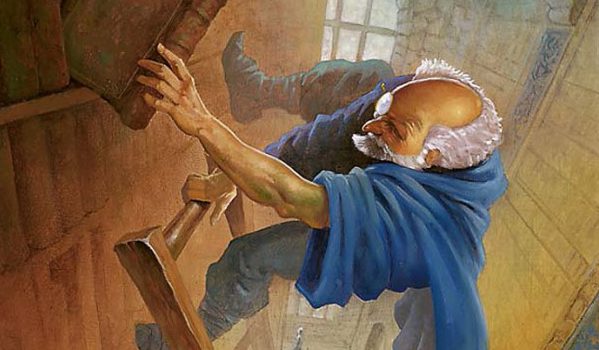Are you a Quiet Speculation member?
If not, now is a perfect time to join up! Our powerful tools, breaking-news analysis, and exclusive Discord channel will make sure you stay up to date and ahead of the curve.
Every so often, it's important to reexamine previously learned ideas. Information changes over time and sometimes what was right at one point is now wrong. More often, however, it's simply been so long since the idea was first learned that it's no longer remembered correctly. It hasn't been forgotten, but the details are foggy. Sufficiently so that there's little practical difference between remembering and forgetting. Such that when you try to actually discuss the thing you fumble around like you made it up and are consequently ridiculed and dismissed. And then being incredibly frustrated because you know that you used to know the definitive answer but you just. Can't. Articulate it anymore. *This intro does in no way, shape, or form come from humiliating personal experience.
Anyway, it's time for me to remind all my readers not to read too far into the metagame data I'll be posting next week. While it is generally true, it's particularly important because next month is ChannelFireball's Not-GP Las Vegas, the first paper event of such a size in a year and a half. It will be the first chance to see what the "real" paper metagame is after not actually having one. And there will temptation to assume that the MTGO metagame will accurately reflect what's going to show up to Vegas. Worse, they may start down an assumption hole that will harm their chances of success. Today we'll discuss how to get the most out of the data that we have.
The Danger of Misapplication
It is generally true that an informed decision is superior to an uninformed one. However, 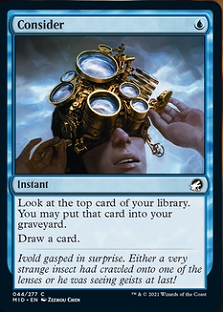 that informed decision is only as good as the information that informs the decision. Information that is somehow lacking is very unlikely to produce a good final decision. That doesn't mean that poor information is useless or if data is thin guessing will produce better results. It does mean the less there is to go on, the more likely it is that an unknown variable will ruin everything. Less complete data provides a worse basis for decision-making than more complete data. And sometimes thin information is all that's available. In those cases it's better to use the data than not. However, it's critical to acknowledge the weakness and plan accordingly.
that informed decision is only as good as the information that informs the decision. Information that is somehow lacking is very unlikely to produce a good final decision. That doesn't mean that poor information is useless or if data is thin guessing will produce better results. It does mean the less there is to go on, the more likely it is that an unknown variable will ruin everything. Less complete data provides a worse basis for decision-making than more complete data. And sometimes thin information is all that's available. In those cases it's better to use the data than not. However, it's critical to acknowledge the weakness and plan accordingly.
This is where the great danger of data analysis lies. Obviously, using false or misleading data is bad and can only lead to bad outcomes. Put bad in, get bad out, only yourself to blame for not doing the legwork. However, a far more subtle mistake is misapplying the data. Data has a source and the data only speaks to that source. Thus, any analysis done with that data will describe and interpret the data for that source. And only that source. To apply it to anything else requires more work and usually involves turning that data into a model or test case. Immediately applying one study to everything (which is what most people want to do because it's so much easier) is bad science but a great way to come to wrong conclusions and subsequently poor ends.
The Metagame Data Trap
Which is my long-winded way of cautioning against reading too much into my metagame updates, however thorough they may be. They are a very valuable resource, and I'm not just saying that because I make them. But I also know better than anyone their limitations. Taking my data and assuming that it accurately reflects the metagame of anything other than an MTGO Premier event is asking for heartbreak. The data I have to work with comes primarily, though not exclusively, from those events and so everything I do with that data reflects the Premier event metagame. 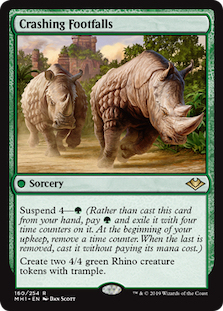 If that's all you want then by all means use my data as a comprehensive guide to your advantage. However, everyone else needs to be careful. The MTGO metagame does not and has never reflected the paper metagame. And this is especially true as events get more local.
If that's all you want then by all means use my data as a comprehensive guide to your advantage. However, everyone else needs to be careful. The MTGO metagame does not and has never reflected the paper metagame. And this is especially true as events get more local.
For example, my FNM metagame looks nothing like MTGO's. There's almost never any Hammer Time, UW Control does mediocrely, and nobody's playing Burn. Instead, it's very much anything goes. Last week there was a lot of 4-Color piles, Scourge Shadow, and off-meta rogue decks. The week before it was Amulet Titan and Mill. Going into that metagame with a deck or sideboard optimized against the MTGO metagame is guaranteed to end poorly. I know because I've been doing it. The Denver area has has a number of Modern $1-2K events recently and the metagame for those tends to be more similar to MTGO's metagame. I can't be bothered to rebuild my deck for FNM, so I just run the same UW Humans list I use at the bigger events. And I do average at best, but I expected that going in. I'm lazy and want to play my deck even if it's bad. Presumably, so do lots of other paper players.
Escaping the Trap
If the metagame data is only accurate to MTGO, then it would seem like it's fairly useless. But it holds that an informed decision is better than an uninformed one. When the data is lacking, you have to put additional work in to make it useful. In the case of the metagame data, it's critical to remember that while it doesn't directly apply to paper events, the MTGO 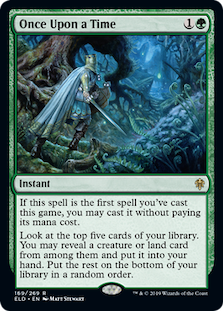 metagame does inform paper's metagame. As I've said, the MTGO data is the only data anyone has to work with. Thus it's everyone's starting point. Everything else is based on how they react to that metagame. If they do at all.
metagame does inform paper's metagame. As I've said, the MTGO data is the only data anyone has to work with. Thus it's everyone's starting point. Everything else is based on how they react to that metagame. If they do at all.
The key for players heading to Las Vegas is to recognize that the actual paper metagame is currently unknown. The only paper data (so far) comes from local events that usually only report the Top 8 (if anything). There's no sense of what to expect. On the other hand, everyone does know what's good online. That doesn't mean that it will be the same in paper, but it is good online. Thus everyone will be reacting to that metagame to the extent they're able. And that last part is critical, because the rental services make it far easier to adopt the best decks online than in paper. Subsequently, many players will end up playing whatever they have available. The savvy players will therefore look at next week's metagame update, remember the card availability and population differences between paper and online Magic, and make their decisions accordingly.
Leveling Yourself
Of course, there's a different danger to beware in being said savvy player. Be sure not to level yourself. The concept of leveled thinking originally came from poker, but it also applies to Magic. Which players noticed and started doing years ago. The basic idea is very simple: there's what you can see, what you can extrapolate, and then what you interpret based on those observations. From there you get into mind games based on what you think is going on and what your opponent thinks is going on. To put it another way, all thinking can be put onto a given level originally articulated thus:
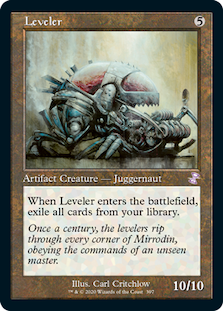 Level 0: What Do I Have? This is the most basic level where you're only thinking in terms of what you actually observe. In other words, what do you know based on the things you can control?
Level 0: What Do I Have? This is the most basic level where you're only thinking in terms of what you actually observe. In other words, what do you know based on the things you can control?
Level 1: What Could My Opponent Have? Given what you can observe of your opponent, what do you think they have? This is where you're interpreting information that you don't actually control.
Level 2: What Does My Opponent Think I Have? What have I done to influence my opponent's thinking? How are they reacting to me and how can I use this? Why or do they believe something about me?
Level 3: What does my opponent think I think he has? The meta level. What does my opponent want me to think and why? Otherwise known as getting into the opponent's head.
Level 4: What does my opponent think that I think that he thinks that I have?-My opponent knows I'm in level 3 and is reacting, so how do I react to that reaction and stay one step ahead?
This can technically go on forever, but every discussion usually stops at level 4. The whole deal is to identify which level your and your opponent are thinking on and then try to be the level above your opponent. And only that level, because to be on the wrong level is to ensure disaster.
How to Wreck Yourself
The danger of leveled thinking is first and foremost being on the wrong level. If you were operating on level 3, but your opponent was only on level 1, you were thinking about things they weren't even considering and putting thoughts into their head that weren't there at all. 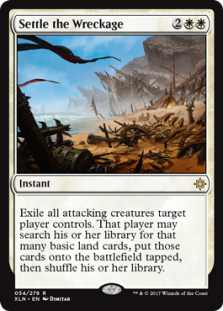 Consequently, you drew conclusions based on incorrect assumptions and ended up playing a game that only existed in your own head. As a result, you're highly likely to play around cards that aren't even in the opponent's deck. And they didn't have to do anything; you just out-thought yourself. Therein lies the great danger in leveled thinking.
Consequently, you drew conclusions based on incorrect assumptions and ended up playing a game that only existed in your own head. As a result, you're highly likely to play around cards that aren't even in the opponent's deck. And they didn't have to do anything; you just out-thought yourself. Therein lies the great danger in leveled thinking.
However, it's arguably worse to get lost in a leveling loop. Which it is far easier for Vizzini to demonstrate than for me to explain. In the clip, Vizzini just keeps going on and on without really considering the implications of each level he's thinking on. Had he done so, he might have realized that Westley was playing a different game entirely. Consequently he lost the game. The same thing will happen in Magic, though with less permanent consequences. Getting too far into thinking about what the opponent is doing just tangles you up in knots and will go on forever... cue the Star Trek clip again.
Check Yourself
From personal experience, I hypothesize that every competitive Magic player has leveled themselves at least once. The competitive crowd enjoys an intellectual card game to win, and subsequently show that they're intelligent and skilled. Thus all of us have wanted to demonstrate this to our opponents and went for some kind of non-obvious/flashy play that 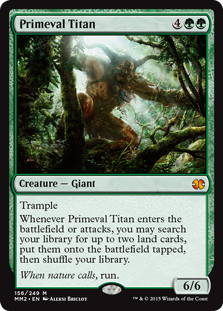 wins the game based on the read we have on our opponent. Only to fail when that read was wrong. And often lose because the flashy play required giving up a board state that was otherwise winning. We've all leveled ourselves because at some point we weren't as smart as we thought. I'm not excluded.
wins the game based on the read we have on our opponent. Only to fail when that read was wrong. And often lose because the flashy play required giving up a board state that was otherwise winning. We've all leveled ourselves because at some point we weren't as smart as we thought. I'm not excluded.
The catch is that each level of thinking requires additional information to reach a valid conclusion. And that information increase is not linear. I would posit that moving from level 0 to 1 is close to linear, but after that it gets increasingly exponential. And if the information requirements increase then the price for lacking that information also increases exponentially. Thus even minor mistakes are going to be amplified massively and will lead to disaster.
How to React
Given all that, how should players utilize the metagame data? As far as I'm concerned, players need to put the available data in the correct level and then recognize which levels other players are likely to be working on. I'll argue that, given that Not-GP Las Vegas is an open tournament and how actual Grand Prix used to be, the population will consist of an even mix of experienced, enfranchised, competitive players and casual players on Day One. 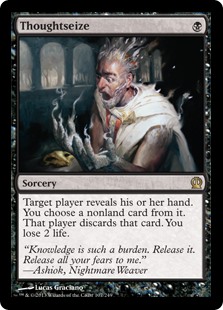 The casuals are likely to be thinking about their deck selection on Level 0, which is what decks they actually have. The competitive players will be operating on at least Level 1, which is the known metagame. In other words, the more competitive players will be aware of the metagame data and making decisions from it. Whether they'll be operating on Level 2 or higher is impossible to say.
The casuals are likely to be thinking about their deck selection on Level 0, which is what decks they actually have. The competitive players will be operating on at least Level 1, which is the known metagame. In other words, the more competitive players will be aware of the metagame data and making decisions from it. Whether they'll be operating on Level 2 or higher is impossible to say.
Therefore, there is an even chance of hitting Level 0 or Level 1 (or higher) players on Day One, with the odds of hitting Level 1 or higher increasing as the day goes on (assuming better players stay around and perform better). In that scenario, Level 2 decks would be favored if and only if they can still beat the Level 0 decks. Otherwise, they're putting all their hopes for success in the hands of the Pairings God. If the God is merciful, then it could be an easy day against matchups that have been metagamed against. If it isn't, you're going to be heading for the side events very quickly. As a result, I'd advise players who want to make Day Two to focus their thinking around Level 1. Use the metagame data to tell you what is good, but not what will actually show up.
Don't Overthink It
The main advice I have is simply don't overthink your deck for Vegas. It's really easy to get trapped in leveled thinking. Recognize the limitations of your knowledge and that everyone that's enfranchised will be operating from a similar level of uncertainty. It's great to outsmart the opponent, but don't let yourself be outsmarted.


